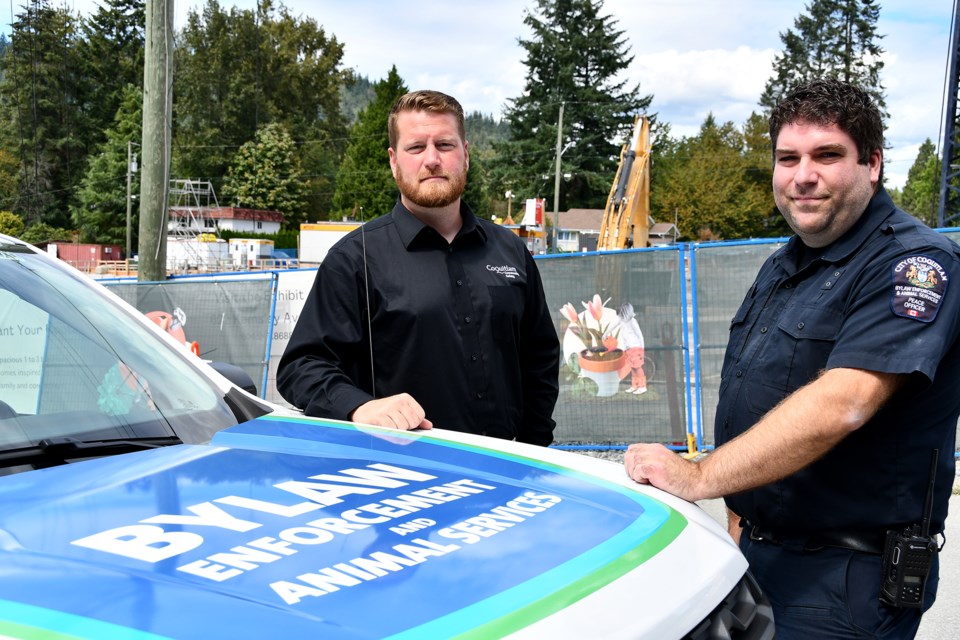For a homeowner, having building crews hammer, drill and dig early or late in the day, or block the roadway with heavy machines, can be a pain.
For tradespeople, not having enough parking nearby, in order for them to do their work and make a living, can also be a sore point.
But, for the municipality, having a general contractor who can’t properly coordinate a construction project or follow the city’s guidelines can turn into a nightmare.
In nearly every neighbourhood in Coquitlam, cranes loom over vacant sites with promises to build bigger and higher.
In the past five years alone, Coquitlam has issued building permits for 13,300 units, of which 80 per cent are in apartments, 15 per cent in townhouses and five per cent in single-family dwellings, duplexes and multiplexes.
The investments are welcome, said Aaron Hilgerdenaar, the city’s manager of bylaw enforcement and animal services, especially to meet the new provincial housing demands to grow faster and provide more affordable homes during the housing crisis.
However, what’s not wanted are companies that can’t follow the basic rules around responsibilities and livability expectations for residents and small businesses, he said.
“We know that most developers are doing their best,” Hilgerdenaar made clear during a visit on Monday, Aug. 19, to the Oakdale neighbourhood, where high-rises are just starting to go up close to the Burquitlam SkyTrain station.
“But for those that don’t want to follow our Good Neighbour Policy, Coquitlam is not the place to do business. We have no tolerance for companies running roughshod.”
Good Neighbour Policy
Adopted by city council in 2019, the Good Neighbour Policy is an “explicit document,” Hilgerdenaar said, that clearly lays out the rules for building in Coquitlam and places the onus on the developer.
It also encourages early and ongoing communication between the developer and local residents and businesses — from the design stage to the end of the process — and calls for trades and sub-trades to be accommodated.
For those who flout the bylaws and their construction management plans, fines await: up to $500 in some cases, and even stop-work orders for continued non-compliance.
So far this year, the city has issued less than a dozen suspensions against developers, Hilgerdenaar said without mentioning the offending company names.
And for developers who don’t tidy their sites, they may see the clean-up charges added to the landowners' property bills the following year.
Hilgerdenaar said staff across all departments at Coquitlam City Hall work together to resolve building infractions and are looking at ways to further clamp down on construction issues that impact neighbourhoods.
Besides a proposal to increase fines next year, staff are considering recommending to council to ensure developers post clear signage onsite that spells out their code of conduct, regulations and contact information for nearby residents and business owners.
As well, the city is asking developers to coordinate their activities with other project managers in the area to double on empty sites for trades parking and storage.
Kyle Kijowski, one of 17 full-time bylaw officers in Coquitlam, said the city is a leader in the Lower Mainland for ensuring construction regulations are met.
Recently, a builder told him Coquitlam was tougher than Vancouver and Surrey for enforcement on such issues as:
- noise disturbances
- unlawful delivery of goods outside of permitted hours
- parking violations
- erosion control
- storage without permits
- unauthorized construction offsite
“We are making sure we have a proactive presence and will take action where needed, without hesitation or warning,” he said.
Business affected
According to the Canadian Federation of Independent Business (CFIB), which released a report titled Hard hats and hard times: Public construction impacts on small business on Tuesday, Aug. 20, nearly 65 per cent of B.C. small businesses have been disrupted by construction projects over the past five years.
And 22 per cent — or nearly 42,000 businesses — report that local building has had a major impact on their operations.
On average, the agency states, B.C. small firms have endured 518 days of building in their neighbourhoods, losing about 18 per cent of their profits and spending around $6,000 in additional expenses to clean up and repair their stores.
“B.C. small businesses face a myriad of issues when local construction projects take place, from traffic congestion and dust and debris, to losing customers and navigating logistical disruptions,” said Emily Boston, CFIB’s senior policy analyst and the report co-author, said in a news release.
“Now, imagine dealing with it for well over 500 days. Sadly, this is a reality for too many B.C. small businesses.”
Construction complaints
If you have a problem with a Coquitlam construction site, you can report it:
- by phone
- to the city’s engineering and public works hotline
- 604-927-3500
- by email
- online
- through the city’s customer feedback form
📣 Got an opinion on this story or any others in the Tri-Cities? Send us a letter or email your thoughts or story tips to [email protected].
📲 Want to stay updated on Coquitlam, Port Coquitlam, Port Moody, Anmore and Belcarra news? Sign up for our free daily newsletter.
💬 Words missing in an article? Your adblocker might be preventing hyperlinked text from appearing.






